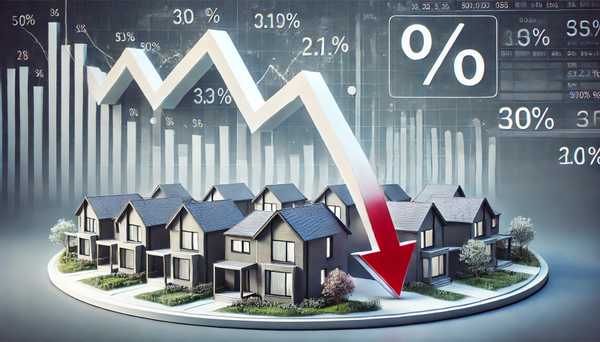
When Will Home Prices Finally Ease?
The dream of homeownership remains a cornerstone of financial security, but for many, rising home prices have put that dream out of reach. The question on many people’s minds is: when will home prices finally start to ease up? While it’s tempting to hope for a sudden crash in prices, experts suggest that’s unlikely. Instead, any meaningful reduction in prices will require a combination of key economic and market factors aligning over time. The Core of the Issue: Supply vs. DemandThe housing market is fundamentally shaped by the forces of supply and demand. For prices to come down, the number of homes available for sale needs to meet or exceed the number of buyers looking to purchase. Unfortunately, the United States is facing a housing shortage of historic proportions. Estimates suggest the country is several million homes short of what’s needed to balance the market. This imbalance keeps competition fierce among buyers, driving prices up even when other economic conditions might suggest otherwise. How Did We Get Here?The roots of today’s housing shortage go back more than a decade. After the 2008 housing crisis, homebuilders pulled back significantly on new construction. The crisis not only reduced demand temporarily but also caused widespread caution in the construction industry. As a result, the number of new homes built each year lagged far behind the pace of household formation. Even as the economy recovered, construction remained sluggish. Rising costs for labor, materials, and land made it more expensive for builders to develop new homes, particularly in the affordable housing segment. By the time builders started ramping up production in recent years, the gap between supply and demand was already enormous. What Needs to Happen for Prices to Decline?Bringing home prices down isn’t an overnight process—it requires addressing the core factors driving the imbalance: Increasing Housing SupplyFor prices to stabilize or decline, more homes need to be available for purchase. This can happen through new construction, existing homeowners listing their properties, or a combination of both. However, building more homes is a slow and complex process. Builders are still catching up from years of underproduction, and challenges like zoning restrictions, high construction costs, and labor shortages continue to slow progress. Easing Buyer DemandIf fewer people are actively looking to buy, competition for homes will decrease, and prices will stabilize. Rising mortgage rates are one factor that could temper demand, as higher rates make monthly payments less affordable for buyers. Additionally, economic conditions, such as slower wage growth or an increase in unemployment, could reduce the number of active buyers in the market. Government InterventionPolicy changes could play a significant role in addressing the housing crisis. For example, incentives for affordable housing development, relaxed zoning laws to allow for higher-density housing, and tax breaks for builders focused on entry-level homes could all help boost supply. Why Prices Aren’t Likely to CrashWhile the idea of a housing market crash might seem appealing to buyers waiting for lower prices, the current market conditions make this scenario unlikely. Crashes typically occur when there’s an oversupply of homes relative to demand, as was the case during the 2008 crisis. Today, the opposite is true—demand far outstrips supply, which serves as a buffer against steep price declines. What Does the Future Hold?Most experts agree that while home prices may not drop dramatically, the pace of price increases is likely to slow over the coming years. Some markets with higher inventory levels or lower demand may see slight price declines, but this won’t be the norm nationwide. Instead, price growth is expected to become more modest, providing some relief for buyers. Local Market VariationsIt’s important to remember that real estate markets are highly localized. What happens nationally may not reflect the conditions in your area. For example, markets with significant new construction or a slowing economy may see more noticeable price adjustments. In contrast, areas with strong job growth and limited housing inventory will likely continue to see rising prices. The Bottom LineEasing home prices requires addressing the supply-demand imbalance that’s been years in the making. This will take time, coordinated efforts, and changes in both market behavior and public policy. While prices may not crash, buyers can expect slower growth rates and more opportunities to enter the market as conditions gradually improve. To understand what’s happening in your specific market, it’s crucial to work with a local real estate expert. They can provide insights into inventory levels, demand trends, and opportunities that fit your budget and goals. Start Your Home Search Here

Should You Sell to a Cash Buyer? Here’s What to Consider
When faced with an offer from a cash buyer promising a quick close, no inspections, and no agent involvement, it’s easy to be tempted by the convenience. However, before making a decision, it’s essential to evaluate the potential trade-offs. What Cash Buyers OfferConvenience and Speed:Cash buyers can often close deals quickly, appealing to sellers looking for a hassle-free process. No Inspections or Repairs:They may waive inspections or repairs, saving time and effort in preparing your home for sale. Certainty of Close:With no financing contingencies, cash buyers typically offer a more straightforward transaction. The Potential DownsidesBelow-Market Offers:Cash buyers are often investors looking to maximize their profit. Their offers usually reflect their needs, not the true market value of your home, which could leave significant money on the table.Limited Market Exposure:Selling directly to a cash buyer bypasses the broader pool of qualified buyers who might compete for your home, potentially driving up its price.One-Sided Negotiations:Without a professional advocating for your interests, you may not get the best terms or deal structure. The Value of Working with a Real Estate AgentMaximized Market Value:Agents use expert pricing strategies and market analysis to ensure your home is listed at its optimal value.Professional Marketing:From high-quality photos to online advertising, agents amplify your home’s visibility, attracting serious buyers willing to pay top dollar.Negotiation Expertise:An agent’s experience ensures you receive competitive offers and navigate counteroffers effectively.Comprehensive Support:From contract reviews to closing day, an agent handles every detail, making the process smooth and stress-free. Weighing Your OptionsSelling to a cash buyer might seem like the easiest choice, but it’s essential to consider how much value you’re potentially leaving behind. With the guidance of a knowledgeable real estate professional, you can explore all your options, understand your home’s true market potential, and make a decision that aligns with your financial goals. Let’s Talk!If you’re thinking about selling, let’s connect to discuss how we can achieve the best results for you. Together, we can develop a strategy tailored to your needs and goals. WHAT’S YOUR HOME WORTH?

How The Presidential Transition Could Impact The Housing Market
The recent presidential election ushers in a period of change that can significantly influence the housing market. Leadership transitions often bring economic policy shifts that ripple through real estate, affecting everything from mortgage rates to affordability. Here’s what you need to know: Potential Impacts on the Housing Market Interest Rates:New fiscal policies and Federal Reserve responses could impact interest rates, influencing mortgage costs for buyers and refinancing opportunities for homeowners.Tax Reforms:Adjustments to federal tax policies, including property tax deductions and capital gains exemptions, could alter the financial appeal of homeownership.Homeownership Incentives:Proposed incentives, such as first-time buyer programs or affordability measures, could open doors for new buyers while potentially increasing demand in certain markets.Housing Supply and Demand:Shifts in federal housing initiatives may affect the construction of new homes, rental assistance programs, and funding for urban development projects, influencing supply levels and housing prices. What This Means for Buyers, Sellers, and Investors Temporary Uncertainty:The transition may create a “wait-and-see” period where buyers and sellers delay decisions until more clarity emerges about future policies.Market Stabilization:Historically, housing activity stabilizes post-election, often rebounding as policies and their implications become clearer.Consumer Confidence:Policy announcements regarding affordability, financing, and employment are likely to shape how consumers perceive their ability to buy or sell homes. How to Navigate This Transition Period Stay Informed:Keep an eye on new policy announcements regarding housing, tax, and economic reforms.Consult Professionals:A real estate agent or financial advisor can help interpret policy changes and assess how they might affect your specific market or goals.Act Strategically:If you’re buying or selling, work with experts to time your decisions around market trends and any anticipated policy shifts. While the presidential transition brings inevitable change, being proactive and informed can help you navigate this period with confidence. Whether you’re planning to buy, sell, or invest, staying ahead of the curve will ensure you’re ready to make the most of emerging opportunities. Contact us
Recent Posts











